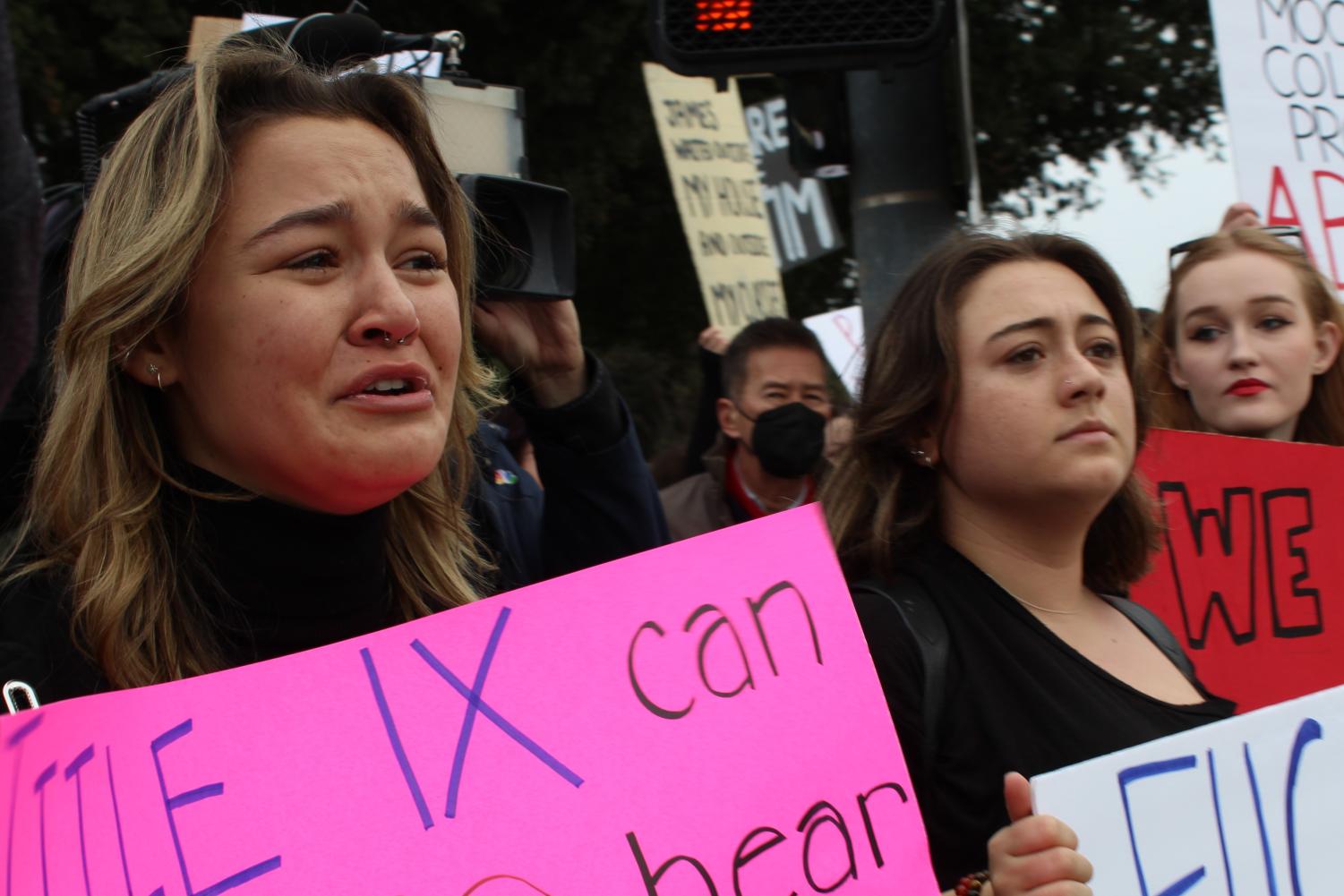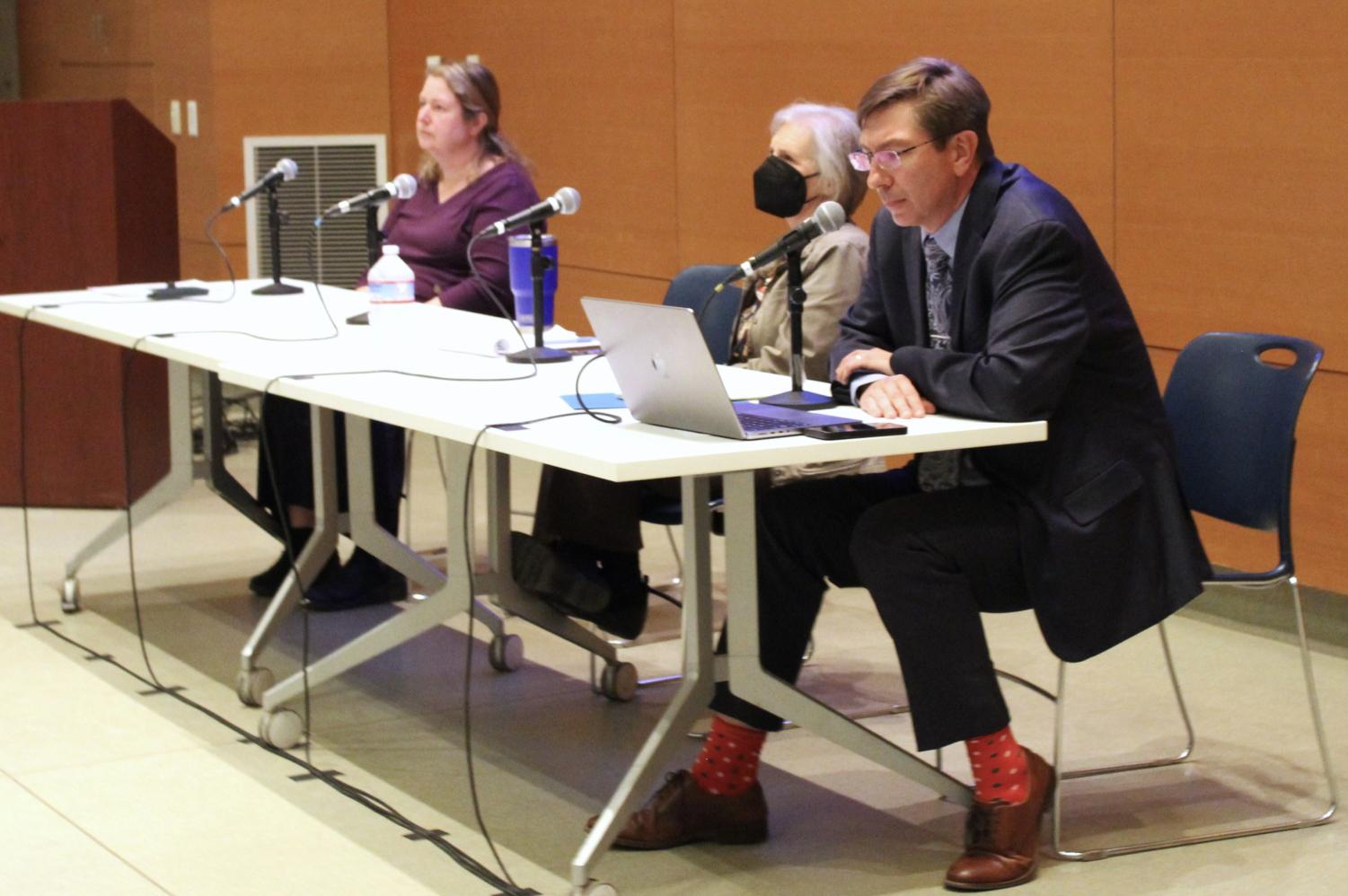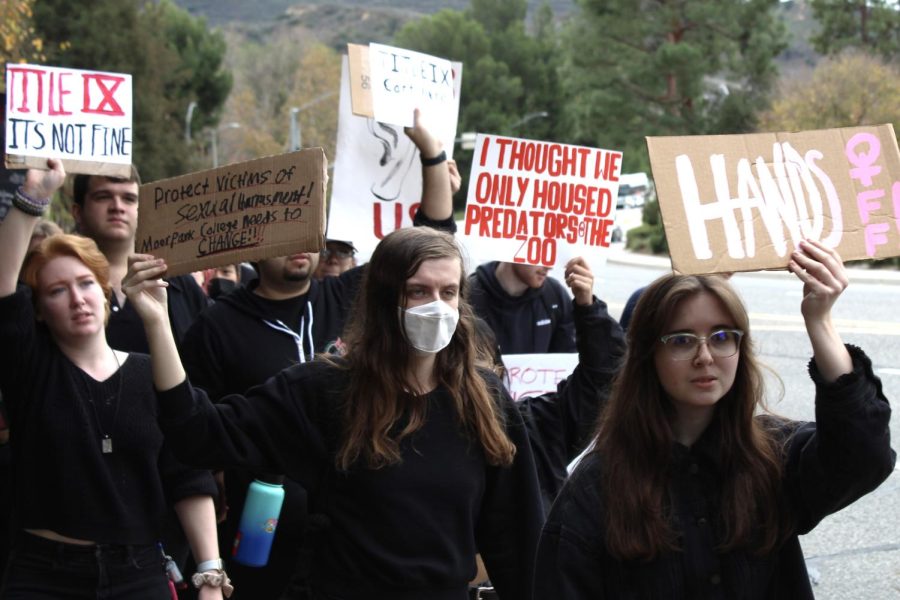Behind the Curtain: What is Title IX?
Students protest Moorpark College’s handling of Title IX complaints on Dec. 15, 2022. The protest took place right outside of the college campus at the intersection of Collins Drive and Campus Drive in Moorpark, CA. Photo credit: Sarah Graue
December 28, 2022
The Moorpark College community experienced waves of frustration and peak activism this month in response to claims of sexual misconduct on campus. In the wake of these allegations, the prevailing question for many students and faculty remains, “What is Title IX?”
Following the onset of sexual misconduct complaints, Moorpark College hosted two Title IX town halls on Tuesday, Dec. 13, to clarify the legal processes and grievance procedures pertaining to sexual misconduct on campus. At the first town hall, Ventura County Community College District Legal Counsel Attorney Pilar Morin sought to answer misconceptions about Title IX , the federal law that prohibits sex-based discrimination in schools.
President Julius Sokenu was present at both town halls and relayed the importance of formally educating students on the Title IX process.
“My commitment as college president is to use this occasion, this moment, to help educate,” Sokenu explained. “To use this as a moment to articulate in a very clear sense, what the process of Title IX is, what the process for reporting sexual harassment, sexual misconduct is.”
According to Morin, a partner at Liebert Cassidy Whitmore Law Firm, 20 U.S. Code § 1681 indicates that Title IX prohibits discrimination within public or private educational institutions on the basis of sex. Under this law, individuals are only protected when sexual misconduct is committed within federally-funded schools and activities in the United States.
If an individual is targeted off campus, the college would not handle the alleged misconduct under Title IX.
“In that case, we would follow California law instead of Title IX,” Morin explained.
Morin said that incidents that occur off campus or don’t meet other Title IX criteria can still be reported to the campus’ Title IX coordinator. Such incidents will then be processed under the California Education Code or Title V of the California Code of Regulations. Morin noted that Title V allows for both verbal and written complaints to be investigated by the district.
As of August 2020, new district regulations have outlined specific definitions of sexual harassment under Title IX. These definitions are located in the district’s administrative procedure and board policy manuals: AP 3434 and BP 3433.
Sexual misconduct is filtered to meet the confinements of Title IX in three main divisions, according to district guidelines. The first is quid pro quo, which occurs when an employee conditions an individual to participate in unwelcome sexual conduct in exchange for benefits. Under California law, specific students with administrative power who arrange this quid pro quo proposal can also be processed under Title IX.
The second category of sexual harassment considered under Title IX is unwelcome conduct that meets a certain threshold of severity:
“Unwelcomed conduct determined to by a reasonable person to be so severe, pervasive, and objectively offensive that it effectively denies a person equal access to an education program or activity,” AP 3434 states.
“This is a very high standard, so if someone makes one comment that is a slur or a joke, it would not meet that definition,” Morin explained. “But again, it would be covered under California law and would be processed under California law.”
The final category lists misconduct that strictly aligns with sexual assault. Actions pertaining to dating violence, domestic violence, rape and stalking are among the many forms of sexual assault formally listed in the code.
While meeting with the Title IX advisor, the complainant (the victim of the alleged sexual misconduct), not a third-party, may choose to proceed with an informal resolution or formal investigation. However, only formal complaints can trigger the grievance procedure. This process to determine a violation includes an objective investigation, hearing proceeding and determination of responsibility.
Title IX proceedings entail due process of law, which means that the respondent (the accused) cannot face repercussions until a thorough investigation is conducted.
“The respondent is not responsible for a Title IX violation until there’s a determination of responsibility.” Morin explained. “It protects all of us, because if any of us are ever charged with an allegation, the regulations are clear that we are not going to be found responsible until there is a complete investigation.”
During an active investigation, both the complainant and respondent are welcome to gather their own evidence to further the case.
If the misconduct falls under Title IX, a hearing will require both the complainant and respondent to be cross-examined in front of decision-makers responsible for determining the appropriate charges. In ordinance with California law, the preponderance of evidence is the legal standard used to legitimize accusations in Title IX procedures.
“Think of this as a scale, and if we have a feather that just barely tips it over, you have met the preponderance of the evidence standard,” Morin said. “So it is not a very high standard to meet, and I bring this up because sometimes [people] misunderstand it to be beyond a reasonable doubt, which would apply in criminal law.”
If it is more likely than not that the respondent harassed a student, the college will side with the complainant and disciplinary action will occur. The determination of responsibility is made by the decision-makers, who are individuals other than the investigators and the campus Title IX Coordinator.
Following Morin’s presentation, Moorpark College students and faculty weighed in on the handling of Title IX complaints at the local and district level by giving public comments.

Ella Boring, a Moorpark College student who has been at the forefront of recent activism on campus, voiced her concerns with AP 3430 of the VCCCD Administrative Procedure Manual being the precedent for handling sexual misconduct complaints.
“When I looked at the procedure, it was inherently vague and very subjective,” Boring said. “I would like to see our administration and the school board take time to revise these measures and implant non-subjective thresholds so that we can have a basis that isn’t subjective, not just putting our faith into the Title IX coordinators.”
Boring also questioned the presence of the Jeanne Clery Act on the Moorpark College Title IX web page. This act requires institutions to annually report information involving crimes on campus.
“I would like to see that database presented to the college Title IX website, because I couldn’t personally find that database and I was looking very hard for it,” Boring said. “We deserve to have that information available to us.”
Moorpark College’s Title IX Coordinator Priscilla Mora took Morin’s place at the second town hall and answered students’ questions about Title IX proceedings. In a statement given to the Moorpark Reporter, Mora relayed that the college investigates all complaints of sexual harassment.

“Moorpark College takes all sexual harassment concerns very seriously and follows up on all reports,” Mora said. “To protect the privacy of all parties involved, the college is unable to comment on specific details of cases.”
Despite the college’s outreach in response to student outcry, a planned protest against the administration and its handling of Title IX complaints, proceeded as scheduled on Thursday, Dec. 15.
During the protest, students repeatedly shouted “Where’s the Title IX?” and “Title IX has failed.”
Upset with the outcomes of their Title IX proceedings, some students have expressed frustration with there being an allowance for an individual with multiple Title IX violations to remain on campus.
According to Morin, just one complaint is enough to get a respondent expelled, but only if the decision-makers find expulsion to be the necessary course of action. In order for an individual to be expelled, the grievance procedure must be followed, regardless of whether the individual already has multiple Title IX violations.
Morin said that the emergency removal of a student, pending an ongoing investigation, does not comply with state law, even though such action is permissible under Title IX regulations. While employees can be put on administrative leave–pending the process–students in the district cannot be put on leave.
“We do have various tools that allow us to protect our campus and the district has a duty to provide a safe campus, but we also have to protect the rights of the individuals involved,” Morin said. “So as we are doing that, we do provide due process and that just depends on what the situation involves.”
Morin said that if there is an immediate threat to their safety, students should contact the police. Title IX matters can be processed simultaneously with criminal investigations.
Administrative actions with regards to specific ongoing sexual misconduct cases on campus were not disclosed during the town halls, but college administrators, including Sokenu, asserted that students’ safety concerns are a top priority.
“The important thing about this campus community that we all treasure so much is that there is a kindness to this campus community, there’s a sense of respect, there’s a collegiality to this campus community, there’s a compassion that we bring to our engagement and most importantly, we value safety,” Sokenu said.
Students affected by sexual misconduct on campus maintain that the administration and Title IX itself are both to blame for the ineffective outcomes of their cases. Whether the recent protest and social media backlash will result in any changes in administrative policy is unclear. However, campus leaders–including student government–say they are working to address students’ safety and well-being concerns on campus.
*Behind the Curtain is a series following the sexual misconduct accusations that broke at Moorpark College early December of this year. The previous story can be found here.










